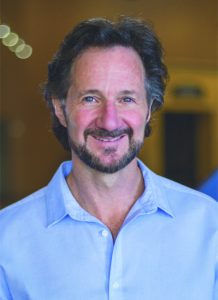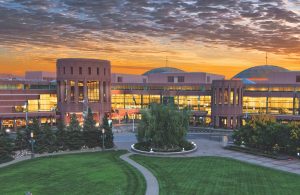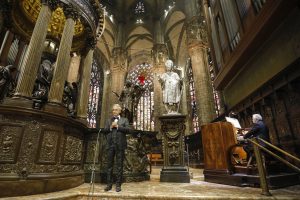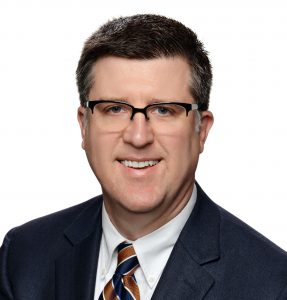
by Steve | May 18, 2020 | Magazine, Magazine Articles, May/June 2020
 By Rob Renfroe –
By Rob Renfroe –
We are living in a time of great turbulence and anxiety. The coronavirus pandemic has stirred panic. As Christians, part of our lifelong discipleship is seeking to allow faith to overcome our fears.
“Do not worry about your life, what you will eat or drink; or about your body, what you will wear. Is not life more than food, and the body more than clothes?” asked Jesus in the Sermon on the Mount. “Look at the birds of the air; they do not sow or reap or store away in barns, and yet your heavenly Father feeds them. Are you not much more valuable than they? Can any one of you by worrying add a single hour to your life?” (Matthew 6:25-34).
The Latin word from which we derive “anxiety” means “to choke.” The Anglo-Saxon root for “worry” means “to strangle.” And that’s what worry does. It chokes the life out of us. It suffocates our spirits. It strangles our ability to make good decisions.
Jesus asks: “Who of you by worrying can add a single hour to his life?” The obvious answer is: None of us can extend our lives by worrying. Not for an hour. Not for a minute. Not for a second. In fact, research tells us just the opposite. Physically, anxiety can lead to hypertension, heart attacks, and a compromised immunological system. Emotionally, it can make you irritable and unstable.
We think we worry because of external circumstances. But that’s not true. You can put two people in identically bad situations, and one will worry and one will not. That’s because worry is determined more by our internal condition than our external condition.
If there is little faith within us, the smallest concerns will fill our hearts with great anxiety. But if we take hold of faith – and let faith take hold of us – there will be little room for fear within us. Jesus provides a prescription for letting go of worry.
First, he tells us to have faith in God’s character. “Look at the birds of the air; they do not sow or reap or store away in barns, and yet your heavenly Father feeds them. Are you not much more valuable than they?” (Matthew 6:26). If God can meet the needs of the birds who have to go out and find food every day, certainly he can provide for us who have the ability to work, and save, and plan.
Do you believe God knows you, loves you, is aware of all your needs, and will provide for you? Not everybody does. I remember praying with an elderly man many years ago who was suffering with cancer. He had lost his wife and he felt alone and he was hurting. I asked him if he knew that God loved him. I’ll never forget his answer. He said: “It feels like God doesn’t even know my name anymore.”
There will be many times in our lives when it will feel as if God does not care about us and that he’s not working for our good. And we must decide: Will I trust my feelings or will I trust my God? Will I trust that God is a good, wise, powerful, and loving heavenly Father who knows what I need?
“God is too good to be unkind and he is too wise to be mistaken,” it has been said. “When we cannot trace his hand, we can always trust his heart.”
I know it’s a frightening time for some of us. Life is uncertain and full of peril. It always has been and it always will be. What’s not uncertain is the character of God. He is our heavenly Father, he knows us, he loves us, he is powerful and wise and he will provide for us.
Second, have faith in God’s promises. “Seek first the kingdom of God and his righteousness, and all these things will be added to you,” said Jesus (Matthew 6:33, ESV).
When we face difficult times, we turn to something. We look for something to trust in and to stand on. Some of us look to our finances. As long as they’re strong, we’re confident and we feel like we can handle whatever the world throws at us. Some of us trust our wisdom and our intellect. Some of us turn to our resourcefulness. Whatever we trust in, one day we will find it insufficient.
When your wife is diagnosed with cancer, when your child is addicted to drugs, when a friend betrays you, when your heart is broken, you are going to find that you need a strength that is greater than what you possess or this world can provide. And you will need to trust in the promises of God: “I know the plans I have for you, plans for good and not for evil” and “Come unto me all you who labor and are heavy laden and I will give you rest” and “Trust in the Lord with all your heart, in all your ways acknowledge him, and he will direct your paths” and “I will never leave you nor forsake you.”
When you’re anxious and afraid, the strength you need will not come from having all the right answers, but from having faith in the promises of God that he will be with you and provide for you all that you need.
Third, have faith that with God’s help you can overcome. The apostle Paul put it this way: “I can do all things through Christ who strengthens me” (Philippians 4:13).
Loss of a loved one, a divorce, getting laid off, illness, financial set backs – nobody wants any of these things. All of them are difficult and painful and give us all kinds of reasons to be anxious and worry. But through faith in Christ, you can do what you need to do to overcome.
“Therefore do not worry about tomorrow, for tomorrow will worry about itself,” said Jesus. “Each day has enough trouble of its own” (Matthew 6:34).
You can’t be anxious about the future and live a full, joyful, Christ-centered, Spirit-filled life in the present. You can live worried about tomorrow or you can live powerfully today – but you can’t do both. “Anxiety does not empty tomorrow of its sorrows,” said Charles Spurgeon, “but only empties today of its strength.” God has promised to give you everything you need for today. Don’t give that strength away by worrying about something that may never happen tomorrow.
Instead, offer a prayer that opens yourself to God’s presence and strength. Or, help someone who’s struggling. Listen to praise music and read Scripture. Before you get out of bed in the morning, count your blessings and declare, “This is the day the Lord has made, let us rejoice and be glad in it.”
Stop looking at your portfolio every day. It’s bad – and it’s going to be that way for a while. Stop addictively watching the news. You can stop accepting the anxiety of the people around you. Just because they’re worried, you don’t have to be. There is something worse than getting sick. That’s living afraid.
But fear is not the mark of the Christian. “For God has not given us a spirit of fear and timidity, but of power, love, and self-discipline,” writes Paul (2 Timothy 1:7). Christian living is walking in power, love, and the self-discipline to do what we can do today and to leave the rest to God.
Has worry ever solved a problem? Has worry every created a solution or given birth to strength or brought God’s power to a desperate situation?
People who are free from burdensome worry are people who make decisions and act. They determine what they can do and they do it. And then they live their life holding on to faith in the character of God, in his promises, and in the belief that with God’s help they can and they will overcome.

by Steve | May 18, 2020 | Magazine, Magazine Articles, May/June 2020

The Minneapolis Convention Center — scheduled to host the 2020 General Conference — announced it is now cancelling gatherings of 50 or more people through May 10. Before the convention center’s decision, the Commission on the General Conference had scheduled a teleconference March 21 to consider postponement of The United Methodist Church’s top legislative assembly. Photo by Dan Anderson, courtesy of Meet Minneapolis and the Minneapolis Convention Center.
By Heather Hahn –
With the coronavirus disrupting lives worldwide, General Conference organizers determined they have no choice but to postpone The United Methodist Church’s top legislative assembly.
The Minneapolis Convention Center – scheduled to host the 2020 General Conference – cancelled gatherings of 50 or more people through May 10. The shutdown covers the first five days of the denomination’s 10-day meeting, which was set to draw 862 delegates, 66 bishops, and others from four continents.
“This news is not unexpected based on the current guidance from health officials and we expect to move forward with new plans as quickly as possible,” Kim Simpson said in a statement. She is the chair of the Commission on the General Conference that plans the big meeting.
The commission’s executive committee, which met by teleconference March 18, decided the venue’s announcement meant that General Conference could no longer go forward May 5-15 as planned. However, commission members do not yet know how quickly they can announce new dates.
The convention center said it made its decision based on guidance from the Minnesota Department of Health “to protect the public’s health and slow the rate of the transmission of COVID-19.”
“Each week, we will seek guidance from MDH on changes to this policy or in the end date,” the convention center added. Before the convention center’s decision, the full Commission on the General Conference had scheduled a teleconference to consider a possible delay.
The Council of Bishops executive committee requested postponement March 13 in response to the life-threatening virus and increasing travel restrictions that might prevent nearly half of the delegates from reaching the U.S. About 43 percent of General Conference delegates come from Africa, Europe or the Philippines.
Bishop Bruce R. Ough, who leads the Minnesota and Dakotas conferences, is a member of the bishops’ executive committee. “I believe the safety of the delegates and the fairness of the conference’s legislative processes are paramount,” Ough said.
“The Dakotas-Minnesota Area has worked very hard to extend extraordinary hospitality to the General Conference delegates and guests. If the Conference is postponed, there would, of course, be disappointment. However, this disappointment would not dampen the area’s openness to working with the Commission on the General Conference to reschedule the event in Minneapolis.”
As of April 20, Johns Hopkins University — which is tracking cases — reported that the coronavirus had infected 2.4 million people and killed more than 166,000 worldwide. In the U.S., more than 41,000 people have died from COVID-19.
“The health and safety of participants, as well as their families and communities, is a primary concern. This includes our concern for the Minneapolis area,” General Conference organizers said in a joint email to UM News. The leaders include Simpson, the Rev. Gary Graves, General Conference secretary, and Sara Hotchkiss, business manager.
“We also want to do all that is within our power to ensure that all delegates are fully able to participate in the many important decisions we are currently facing as a church,” they said.
Under The United Methodist Church’s constitution, General Conference is to meet every four years “at such time and in such place” as determined by General Conference itself or “by its duly authorized committees.” The General Conference commission, which is elected at General Conference, is that duly authorized committee. Only the full commission is able to set a new date or decide on an alternate plan.
The convention center’s announcement means that the church will not incur significant financial penalties for cancellation of the contract.
General Conference is not like a typical church meeting or worship service, some of which have already moved online because of the virus.
The 10-day international legislative meeting resembles a session of the U.S. Congress with elements of a United Nations general assembly.
Multiple interpreters work with hundreds of delegates throughout the gathering to translate proceedings. During the first week of General Conference, delegates meet simultaneously in different legislative committees – 14 were planned for this year. The delegates then come together to vote in plenary during the second week. All votes are by secret ballot, using secure voting devices of limited range. Many delegates come from countries where internet connections are unreliable, if available at all. The logistics of General Conference involve obtaining hundreds of visas and reserving hotel rooms, flights, and the venue needed for more than 1,000 people.
For this year’s gathering, the General Conference commission also was adding stricter requirements for credentialing after an investigation found four ineligible people cast votes during the 2019 General Conference using credentials of absent delegates.
General Conference organizers and the bishops acknowledge the legislative assembly scheduled this year comes at a particularly sensitive time for the church. United Methodists have submitted multiple proposals to resolve the denomination’s longtime debate over homosexuality by splitting the denomination.
General Conference also faces other critical decisions such as setting the denomination’s four-year budget and electing numerous leaders including the members of the Judicial Council, the denomination’s top court.
“We will be moving forward responsibly and that includes a number of complex matters that must be planned for,” General Conference organizers told UM News.
Heather Hahn is a multimedia news reporter for United Methodist News.

by Steve | May 18, 2020 | Magazine, Magazine Articles, May/June 2020

Andrea Bocelli and organist Emanuele Vianelli in the Milan Cathedral. Photo: Luca Rossetti (Decca Records).
By Steve Beard –
Perhaps no singular image better captured Easter under the treacherous cruelty of the coronavirus than Andrea Bocelli performing a solitary sacred concert in the spectacularly cavernous Duomo di Milano, the cathedral in Milan, Italy.
By the time the sun had risen on Easter morning, more than 108,000 deaths had occurred around the globe because of COVID-19. According to Johns Hopkins University, there were more than 1.7 million cases worldwide and the virus was detected in 177 countries. At that time, more than 400,000 people had recovered internationally. By the time you read this, all those statistics will be woefully outdated.
“Zoomed” out and stir crazy, legions of sequestered souls were craving relief – something of substance, a dash of beauty, a sliver of hope. There would be no ostentatious Easter bonnets at church this year. There would be no large family feasts – including Aunt Judy’s deviled eggs on the most sacred day of the year. There would be no neighborhood Easter egg hunts for the children. For many, the Sunday morning service included singing “Up from the Grave He Arose” in pajamas and house slippers while live-streaming and praying for the speedy and joyous return of congregational worship – even surrounded by those bellowing off-key.
Bocelli had been invited by the city of Milan and the cathedral to lift the spirits of grief-stricken Italians. As a certifiable star of opera, classical, and pop music, the tenor has sold over 90 million records worldwide.
“On the day in which we celebrate the trust in a life that triumphs, I’m honored and happy to answer ‘Si’ to the invitation of the City and the Duomo of Milan,” Bocelli said in the video’s introduction. “I believe in the strength of praying together. I believe in the Christian Easter, a universal symbol of rebirth that everyone – whether they are believers are not – truly needs right now. … It will be a joy to witness it, in the Duomo, during the Easter celebration which invokes the mystery of birth and rebirth.”
The setting was awe-inspiring. Milan’s Cathedral is an architectural gemstone. It has been under construction on-and-off since 1386. It is nearly the largest sanctuary in Italy, second only to St. Peter’s Basilica in Rome. “What a wonder it is,” observed Mark Twain about the cathedral in his book Innocents Abroad. “So grand, so solemn, so vast!” There are 135 marble spires and thousands of statues of prophets and patriarchs, martyrs and saints.
The size and scope are hard to comprehend. More than 40,000 people can fit comfortably within the cathedral. Sadly, more than half that number of Italians have died from COVID-19.
On Easter, the cathedral was empty – with the exception of Bocelli, organist Emanuele Vianelli, and a skeleton film crew. The tenor and musician were the only two that did not wear masks.
The international opera sensation sang several stirring numbers in Italian from inside the cathedral. Bocelli then slowly walked through the gargantuan columns down the center aisle to sing “Amazing Grace” in English overlooking the barren plaza outside as his finale. The first verse was unaccompanied by the organ. It was as if he was rolling away a stone and taking the empty-grave message of Easter outside the confines of altar and sanctuary to a hope-starved world.
The response was astounding. Nearly 3 million people around the globe witnessed the half-hour concert on YouTube as it was being performed. Within 24 hours, the performance had 32 million views. For so many – approaching Easter from vastly different spiritual perspectives – this was the message:
Amazing grace! How sweet the sound
That saved a wretch like me!
I once was lost, but now am found;
Was blind, but now I see.
The words of the song have unique resonance with Bocelli. As many know, he was diagnosed with congenital glaucoma at 5 months old, and became completely blind at age 12, following a sporting accident.
“I am moved and delighted to have received such an overwhelming reaction that has gone beyond our highest expectations,” Bocelli said the following day. “For an artist, yesterday’s event is the reason for the sacrifices of a lifetime; for a believer and a Catholic as I am, it was further confirmation of the benevolent smile with which the Heavenly Father looks to his children. It was an immeasurable honor and privilege to lend my voice to the prayers of millions of people, gathered in a single embrace – a small, great miracle of which the whole world was the protagonist and which confirms my optimism about the future of our planet.”
’Twas grace that taught my heart to fear,
And grace my fears relieved;
How precious did that grace appear
The hour I first believed!

Photo: Luca Rossetti (Decca Records).
The weeks prior to Easter had been overwhelming for Italians. Funerals had to be cancelled. Social distancing had been rigidly enforced. There had been video footage of a convoy of military trucks transporting bodies away from an overwhelmed crematorium in the northern city of Bergamo, 30 miles east of Milan. The national newspaper Corriere della Sera reported that the operation had taken place with 18 army trucks transporting around 60 coffins away from Bergamo to be taken to neighboring cities. “The crematorium in Bergamo, working flat out on a 24-hour basis, can cremate 25 deceased persons. It’s clear that it could not handle the numbers seen in the past few days,” said the statement from the Bergamo municipal government.
Yea, when this flesh and heart shall fail,
And mortal life shall cease,
I shall possess, within the veil,
A life of joy and peace.
The YouTube audience responded to the concert with comments filled with gratitude. “Andrea Bocelli’s songs speak to the soul, especially in these devastating times. May God heal our land and strengthen every living soul on Earth. Lord, your children are crying out for your love,” said one fan named Sydney.
“Extraordinary voice,” said another fan named Hayley. “Such beauty. We all need this during these difficult days. We must support one another, love, be grateful. Life is so delicate, precious.”
The great novelist Fyodor Dostoevsky once wrote, “Beauty will save the world.” Since he penned that premise, those words have been hotly contested. Perhaps from the response to Bocelli’s affirmation of faith through his songs, we can see the outline of what Dostoevsky may have meant.
Steve Beard is the editor of Good News.

by Steve | May 18, 2020 | Magazine, Magazine Articles, May/June 2020

Artwork by Scott Erickson (scottericksonart.com).
By Omar Al-Rikabi-
“A terrible screaming began among the English,” John Wesley wrote in his journal, “But the Germans calmly sang on.”
Sailing aboard The Simmons from England to the American Colonies in 1736, Wesley found his ship overtaken by storm after storm. Ironically, the ship sailed in October in an attempt to dodge hurricane season, but now here they were, with the wind and sea tearing the main sail in two and water flooding the boat.
Wesley, a minister starting what would be a failed missionary trip to Georgia, was scared of drowning and found himself in a crisis of faith, “ashamed of my unwillingness to die.” But also on board were 26 Moravian missionaries from Herrnhut, Germany, and as he worried, they worshiped.
It’s fitting that the founder of our movement hoped to avoid hurricanes, because today the United Methodists are facing their own category 5 storm: Being in ministry during a worldwide pandemic and awaiting a postponed General Conference that will determine the future of our denomination.
The thing about hurricanes is that we can see them forming out at sea a long way off, days away. The anxiety builds when the weather reports put all the different “spaghetti model” forecasts on the TV screen showing all possible trajectories, turns, landfall locations, wind speeds, and flooding.
But no one really knows where a hurricane will hit and how bad the damage will be until it actually gets here. And if you’ve ever been through a hurricane, it doesn’t matter how much you prepare or even if you’ve been through one before, when they hit they’re still a shock and they do some kind of damage. The issue is how much, and what it will take to recover.
The anxiety is building. There is shock and there will be damage. But nobody knows what will actually happen until we experience the full ramifications. So what are churches to do while we wait, and who are we going to be in these storms? What’s our plan?
Our plan should be breakfast. Stick with me on this.
In Acts 27, the Apostle Paul sets sail for Rome, and along the way “the weather changed abruptly, and a wind of typhoon strength (called a ‘northeaster’) burst across the island and blew us out to sea” (Acts 27:14, NLT). The crew panics and starts heaving cargo overboard to lighten the load. They lower the lifeboats, but Paul convinces them they’ll all drown if they jump ship, so they cut the boats loose. They can’t see the sun or the stars, so they can’t navigate. And in dramatic fashion, the Scripture says, “at last all hope was lost.”
All fear and no hope. Sound familiar?
Finally, after two weeks of fearfully trying to outlast the weather, Paul’s had enough and offers them … breakfast: “Just before dawn Paul urged them all to eat. ‘For the last fourteen days,’ he said, ‘you have been in constant suspense and have gone without food – you haven’t eaten anything. Now I urge you to take some food. You need it to survive. Not one of you will lose a single hair from his head.’ After he said this, he took some bread and gave thanks to God in front of them all. Then he broke it and began to eat. They were all encouraged and ate some food themselves. Altogether there were 276 of us on board” (Acts 27:33-37).
It wasn’t that the sailors couldn’t eat because the storm left them with no food. They had plenty of food but were too afraid to eat because of the storm. And what did Paul serve first? The Eucharist. Holy Communion. The body of Jesus Christ: “[he] took some bread, gave thanks to God before them all, and broke off a piece and ate it. Then everyone was encouraged and began to eat.” That’s the Lord’s Breakfast. The crew had so many seconds and thirds that they were throwing food overboard!
As our hurricane approaches, how do we do the same? How can pastors and congregations learn from and lead like the Apostle Paul?
One possibility is by looking at the “Waffle House Index.” What is that? It is an informal metric the Federal Emergency Management Agency (FEMA) has used to determine how bad a storm is and how long recovery will take. Why? Because the corporate leadership at Waffle House have a whole system for keeping restaurants open in a storm. They know how to do natural disasters.
The index is three colors based on what they can offer: green means Waffle House is still serving the full menu; yellow means they’re serving a partial menu because there is no power or water; red means no menu and the restaurant is closed, so you know the damage is bad – really bad.

Photo by Chad Brooks.
We need to be a “Waffle House church,” first offering people the body and blood of Jesus Christ, then offering a full menu of the faith even in the midst the storm. How?
First, we need to know our menu: the full story of Scripture and the robust depth of our theology, not just our favorite orders (the items we like to pick and choose). How do we learn (or re-learn) it? Maybe we need a congregation-wide confirmation class, a deep dive into the Apostle’s Creed, maybe a renewed form of small groups that Wesley called class meetings and banded discipleship. Whatever a Holy Spirit imagination gives us for preaching and teaching, we can’t know our menu just for the sake of more information, but for the sake of transformation into being like Christ.
Second, we need to become better customers. Yes, there’s a lot of talk about how Christians shouldn’t be consumers, but that’s not what I’m talking about here. If you’ve ever waited tables, you know customers are most known for one thing: complaining. Maybe it’s because “the customer is always right” even when they’re wrong. I get it, because if you feel left out of the preparation process (not in the kitchen, so to speak), or your expectations haven’t been met (“This isn’t what I ordered!”) it’s easy to become disenfranchised. But we’ve got to move away from all the grumbling, criticizing, and fear-mongering. In other words, we’ve got to stop screaming.
Third, we need to move from being customers to being waiters. Theologically speaking we’re supposed to be “servants,” because Jesus says things like, “For even the Son of Man came not to be served but to serve others and to give his life” (Mark 10:45, NLT). And of course, one of our mandates is to have the same attitude of Jesus Christ who took the position of a servant (Philippians 2:5-7).
Consider a story from last November of a Waffle House in Birmingham, Alabama. Because of a glitch in scheduling, just one cook was on duty after midnight to manage about 30 hungry and inebriated customers. He couldn’t keep up, but then one customer got up, put on an apron, and started washing dishes. Another started cleaning tables and serving coffee. With the two customers-turned-waiters at work, the lone employee could keep cooking.
To be this kind of servant in the storm evokes what Wesley wrote about later in his journal at sea: “There is something special about these Germans. They are always so happy! And, they do the menial jobs on this ship without protesting.”
Remember, we’re not a bunch of inebriated customers at one in the morning, we’re servant people filled with the Holy Spirit (Acts 2). This means our storm might give us the opportunity to creatively step up and serve the souls of some hungry and angry people (aka “hangry”). But like Paul, we’re serving them Jesus in the middle of the storm because Jesus is the one who created the very wind and waves (Colossians 1:16) and then later spoke to the storm and told it to calm down (Mark 4:35-41).
And isn’t it interesting that when he was in the storm at sea Wesley asked himself, “How is it that thou has no faith?” which is the same thing Jesus asked his disciples in their boat? Jesus is asking us the same question now.
John Wesley said, “You have one business on earth – to save souls.” What does that business look like in our churches in this season of storms? It looks something like the way late chef Anthony Bourdain described a Waffle House: “Where everybody, regardless of race, creed, color or degree of inebriation, is welcomed. Its warm, yellow glow – a beacon of hope and salvation – inviting the hungry, the lost, the seriously hammered all across the south to come inside. A place of safety and nourishment. It never closes. It is always faithful, always there for you.”
And what happens when the storm moves from a metaphorical hurricane to a literal pandemic? The Waffle House had to move to essential staff cooking up a limited menu for take-out. The restaurant building may be closed, but you can still get waffles to eat at home. While not ideal, it sure beats no waffles at all.
The church is still open, but only for essential staff to prepare limited worship services online and Bible studies for streaming-out. The church building may be closed, but we can still receive Jesus in our homes. The basics of the menu have not changed, and the opportunity of how to be better servers has shifted.
Eventually, Jesus will return and there will be no more storms (literal or metaphorical). And when he does we know that, “The servants who are ready and waiting for his return will be rewarded. I tell you the truth, [Jesus] will seat them, put on an apron, and serve them as they sit and eat!” (Luke 12:37, NLT). Until then, we might as well set the table.
Omar Al-Rikabi is the senior pastor of Heath United Methodist Church in Heath, Texas, and the author of The Advent Mission (Seedbed). This article first appeared on WesleyanAccent.com. You can follow him on Twitter @omarrikabi.

by Steve | May 18, 2020 | Magazine, Magazine Articles, May/June 2020

Photo by Kate Jayne.
By David F. Watson –
The year 1906 marked the publication of G.K. Chesterton’s poem, “O God of Earth And Altar.” It subsequently was put to haunting music and adapted as a hymn. Although it was written over a century ago, it is nevertheless a song for our times.
O God of earth and altar,
Bow down and hear our cry,
Our earthly rulers falter,
Our people drift and die;
The walls of gold entomb us,
The swords of scorn divide,
Take not thy thunder from us,
But take away our pride.
From all that terror teaches,
From lies of tongue and pen,
From all the easy speeches
That comfort cruel men,
From sale and profanation
Of honour and the sword,
From sleep and from damnation,
Deliver us, good Lord.
Tie in a living tether
The prince and priest and thrall,
Bind all our lives together,
Smite us and save us all;
In ire and exultation
Aflame with faith, and free,
Lift up a living nation,
A single sword to thee.
Chesterton’s poem is no upbeat ditty. It is a poem of penitence. We have sought comfort in the wrong ways, he says. We have sought solace in the wrong places. We have trusted in our flesh, sought to shape our lives in our own strength. The poem entreats God to teach us how to regard both the world and our Creator.
C. S. Lewis conveys the same idea more succinctly in The Great Divorce: “There are only two kinds of people in the end: those who say to God, ‘Thy will be done,’ and those to whom God says, in the end, ‘Thy will be done.’”
The question that both Chesterton and Lewis press is, “Who is really Lord of our lives?” We have the choice between self-will and submission to Christ. We can labor under the illusion that we are in control of our lives, or we can accept the fact that this world is marred by sin, and we are subject to sin and death. When we submit to the lordship of Jesus, God will overcome sin and death in our lives. When we insist on self-will, sin and death reign with ever greater authority. Self-will is a delusion, and only by submission to the one true Lord can we be free.
O God of earth and altar,
Bow down and hear our cry,
Our earthly rulers falter,
Our people drift and die.
The Perils of Pretense. Jesus is Lord. That is the earliest Christian confession, and it could be costly. Jesus is Lord, and he abides no rivals. Neither Zeus, Athena, Heracles, nor any other deity could be lord of any part of human life. Honor could not be lord. Wealth could not be lord. The Roman Emperor certainly had temporal power and made claims to divine lordship, but he could not really be lord, either. He simply had enough power and authority to act as a spectacular poseur.
The problem then, as it is now, was that it was just so easy to allow someone or something besides Jesus to lord over human life. The Parable of the Rich Fool (Luke 12:13-21) is often cast as a lesson about greed. To some extent this is true, though the parable is about more than money. It is about lordship. Note the setting of the parable. It follows an admonition to stand firm in the midst of opposition, even persecution (12:1-12). Jesus warns, “I tell you, whoever publicly acknowledges me before others, the Son of Man will also acknowledge before the angels of God. But whoever disowns me before others will be disowned before the angels of God” (12:8-9). Will you acknowledge Jesus as Lord, even when it is most difficult?
In the passages after the parable, Jesus encourages trust in God (12:22-34) and warns his listeners to be watchful, like dutiful servants awaiting their master’s return (12:35-47). He then prophesies that he will create division even in the midst of the family. “From now on there will be five in one family divided against each other, three against two and two against three. They will be divided, father against son and son against father, mother against daughter and daughter against mother, mother-in-law against daughter-in-law and daughter-in-law against mother-in-law” (12:52-53). The family was where one found safety, security, and honor. To be disconnected from the family was to be cut off from the center of your world. Will you acknowledge Jesus as Lord, even when it costs you what you thought was most important?
The Parable of the Rich Fool, then, is one piece in a section dealing with trust in God and the lordship of Jesus. In a short parable Jesus puts the matter quite starkly (12:16-21): “The land of a rich man produced abundantly. And he thought to himself, ‘What should I do, for I have no place to store my crops?’ Then he said, ‘I will do this: I will pull down my barns and build larger ones, and there I will store all my grain and my goods. And I will say to my soul, Soul, you have ample goods laid up for many years; relax, eat, drink, be merry.’ But God said to him, ‘You fool! This very night your life is being demanded of you. And the things you have prepared, whose will they be?’ So it is with those who store up treasures for themselves but are not rich toward God.”
There are things that are temporary, and there are things that are eternal. Wealth, possessions, honor, the acceptance of family and friends – all of these are temporary. The lordship of Jesus is eternal. The things of this world will fail you. Jesus will not. We may be tempted to exchange false gods for the true God, but our false gods cannot save us.
From sale and profanation
Of honour and the sword,
From sleep and from damnation,
Deliver us, good Lord.
Pandemics and Penitence. The COVID-19 pandemic has wrought devastation. Many have lost their jobs. Many have been isolated and lonely. Many have died. The cost has been tremendous. Someday we will look back upon this time and give thanks that it has passed. When we return to our churches, we will hug one another and shed tears. We will always remember those days when we could not leave our homes and worship together. Perhaps we will even recover a sense of the great privilege of public worship.
The pandemic has changed us. It has exposed the myth of our own lordship. There have been epidemics and pandemics throughout history, many far worse than we have experienced with COVID-19. In the Western world of the twenty-first century, however, we are not used to dealing with such massive disruption of our daily lives. We are not used to losing control so thoroughly. We live under the illusions of safety, security, and comfort. Occasionally these illusions are punctured. A bad diagnosis, a natural disaster such as a tornado, or an unexpected divorce can bring home for us very quickly how fickle, even cruel, life can be. They can show us how little control we actually have even of our own lives, much less the lives of those around us.
In this case, however, the myth of our own lordship has been obliterated for multitudes all at once. In the U.S., the economy was roaring. Unemployment was low. Retirement plans were high. Business was booming – until it wasn’t. A virus brought the world to its knees. Had you told me last last year that by March I would be confined to my house, that the building where I work would be closed for over a month, that I’d be unable to attend church or get a haircut or eat at my favorite restaurants or even meet with friends in my living room, I wouldn’t have believed you. Yet here we are.
God did not unleash the coronavirus on the world. This is no divine punishment or some cruel way of reminding us of our own finitude. Yet God can and will work through tragedy to bring redemption. The pandemic has stripped away many of our comforts. It has shattered our illusions of lordship. It has forced us to confront our human weakness. And now that we have been shorn of these illusions, perhaps we are better positioned to receive the one true Lord of our lives.
Revival is taking place all over the world today, but in the postmodern West it is occurring only in limited pockets. I have often suspected that this is primarily because of our unprecedented material prosperity. Perhaps we are simply too comfortable, and our comfort has become a narcotic, anesthetizing us to the pain and emptiness that attend our lives apart from a relationship with our Lord. Augustine wrote in prayer, “You have made us for Yourself, and our hearts are restless until they rest in You.” But what if we have learned to numb this restlessness, and thus arrest the impulse to seek the salvation for which Christ died? This may be the tragic, true story of Western Christendom, at least until now.
I wish this pandemic had never happened, but it has. Its effects have been heart-rending. What would make it more so, however, would be if we who follow Christ were to learn nothing from it. Perhaps in the midst of the pain that has accompanied COVID-19, we can begin to see ourselves more clearly, and thus turn our hearts to the only One who can make us whole. Minus the fog of false comfort, perhaps we will repent of our misguided loves and recommit ourselves to our Lord Jesus Christ.
The walls of gold entomb us,
The swords of scorn divide,
Take not thy thunder from us,
But take away our pride.
David F. Watson is professor of New Testament and the academic dean at United Theological Seminary in Dayton, Ohio. He is the author of Scripture and the Life of God (Seedbed).

by Steve | May 18, 2020 | Magazine, Magazine Articles, May/June 2020

Original art by Sam Wedelich (www.samwedelich.com).
By Elizabeth Glass Turner –
Sanctification is fun when it’s under our control.
Out of the corner of our eye, we have peripheral awareness of how close to being faith consumers we really are. We choose to go to a conference so we can grow spiritually. We choose to show up to Bible study so we can grow spiritually. We choose to read a book so we can cry or become more efficient or grow spiritually.
We choose.
We choose the parameters of our growth. Where we next discern/feel/think that God is leading us. What we will “give up” for Lent. The solution is perceived as whatever antidote to lukewarm faith fits the bill. I’m not sure the problem is lukewarm Christians, though. I think the problem is more the insidious mindset that is entangled in our approach to faith: that we set the table, invite the guests, and choose the menu of our own spiritual growth. That we’re in charge. That we can choose what outcomes we want to see in our spiritual life. That we control how we want to be made Christlike.
If you can choose what to give up for Lent, you’re living in a place of blissful abundance. Don’t take it for granted. Years back during Lent several areas of life imploded at once. In the wake of the economic collapse in 2008, there was a lot of scarcity, especially in certain areas of the country. My household was affected directly, and I remember writing a short reflection including the comment, “What do you give up for Lent when you’re already in a season of scarcity? What does fasting look like when the cupboards are pretty bare?” Lent had changed from practices I chose and controlled to something outside my control, and I didn’t like it.
God had allowed my chosen self-denial to be replaced with real desperation.
It was awful, and there’s no good way to spin or market it.
It hadn’t really occurred to me before what fasting sounded like to people who struggled to afford groceries, or who waited for their food stamps to be refilled. One day during that time — when the news was full of stories of foreclosures, whole subdivisions emptied, when the rust belt was contracting and people moved across the country away from their lifelong hometowns in order to find work — I came across a story of a humiliated woman who drove a luxury car to the food bank she used to donate to. In desperate tones she explained a paid-off, reliable vehicle was one of the only decent assets she had left and it didn’t make sense to trade it in for a cheaper but possibly less reliable car. But that meant that she was driving to the food bank in shiny German engineering.
Before the housing market crisis and Wall Street meltdown, if this woman had chosen to live on a strict budget, she would have been living in self-denial; it’s the removal of options that leads to desperation, no matter how well-resourced or well-connected you’re accustomed to being. Sometimes we instinctively recoil from people going through hard times, as if back in our minds is a hidden, primitive instinct to label tragedy or suffering “unclean.”
How did God let me learn about what Lent looks like when circumstances careen out of control? Several times over the years something would happen – why around Lent? – completely out of my control.
I’m trying to be pious and become Christlike, God. Why won’t you let me?!
In 2017, I had a completely unforeseeable health crisis and after misdiagnosis and falling asleep night after night praying I would wake up the next morning, eventually had emergency surgery and a painful recovery.
That’s a bit more “from dust you come, to dust you shall return” than I meant, God.
In 2018, my husband was stricken with a serious set of grave symptoms that left him on bedrest all winter. I joked that I was fasting from certainty. It wasn’t that much of a joke. Finally, he found relief in the spring.
Well, someday I’ll get back to a normal Lent.
In 2019, his symptoms returned and relief was elusive for over six months. Again, a Lent full of doctor appointments, insurance arguments, hours spent on hold, notes documenting symptoms scribbled down.
Will I ever get back to a normal Shrove Tuesday pancake supper?!
To proclaim that Jesus is Lord means this: I won’t always get to decide how or by what means I grow spiritually. What does the fruit of the Spirit look like when a doctor’s office receptionist is callous, flippant, or rude? What does it look like to be Christlike when you’re grieving lost opportunity due to difficult-to-diagnose chronic illness? What does joy look like when you realize your kids will be spending part of their spring break accompanying a parent to another physician appointment?
None of this fits on the brochure for “Christianity: Come Join Us! Really, It’s Not that Bad!”
I can’t guarantee you stability in this life. I can’t guarantee you won’t face tragedy. I can’t guarantee you won’t experience mind-numbing grief.
I can witness to the goodness of God, though.
I can, and will, bear witness to the power of Jesus Christ, the lamb of God who takes away the sins of the world.
I can worship God from inside the blasting, scorching furnace, while evil asks, “Didn’t I put three people in there? I see a fourth man, and he looks like the Son of God.”
If I let go of the outcomes I hope for, I can grab onto the person of Jesus.
Jesus is Lord, and nothing in heaven or hell, nothing on earth or out past Pluto, no entity or circumstance can erase the goodness of God. Jesus is Lord and victory belongs to him even when I don’t get to choose the battle.
Please God, I’d like to go fight in that battle over there.
“This is what I have for you.”
I’m so much better over there, you gave me gifts for it! I’m sure that’s where you need me.
“I need you here.”
That doesn’t make sense.
“No, it just doesn’t make sense to you.”
It turns out getting up and responding to altar calls is pretty good practice for the much harder business of following Jesus in the dark.
There will be times you get to choose and pursue ways to grow spiritually. There will be times you are thrown into a whirlwind, into a vortex, and forced to respond.
In all things, Jesus is Lord, and nothing can force us to stop testifying to the goodness and power of Jesus Christ, whether we like our circumstances or not.
Elizabeth Glass Turner is the managing editor of Wesleyan Accent (wesleyanaccent.com). This article first appeared on ArtofHoliness.com.










